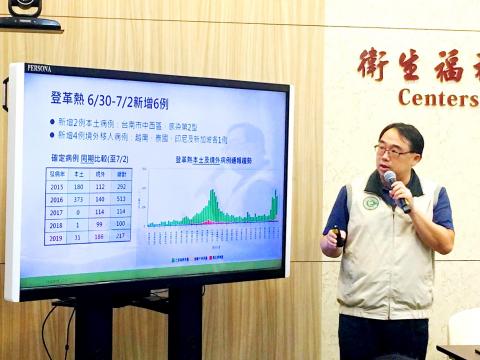The second and third indigenous cases of dengue fever in Tainan this year have been confirmed, the Centers for Disease Control (CDC) said yesterday, adding that the two cases are believed to be linked to the same traditional food market in the city’s Northwest District (中西).
Before Tainan’s first indigenous case of dengue fever was reported on Saturday in Yongkang District (永康), all of this year’s cases had been reported in Kaohsiung.
The patients in the second and third cases were women in their 70s living in Northwest District’s Kaishan Borough (開山里), CDC Deputy Director-General Chuang Jen-hsiang (莊人祥) said.

Photo: CNA
Neither woman had visited Kaohsiung or Yongkang District, or traveled overseas, but both had visited the East Market (東菜市場) and a local temple, Chuang said.
The women were confirmed to be infected with dengue virus type 2 (DENV-2), the same as the first case in Tainan, Chuang said, adding that the women’s homes were only 200m away from where the first infected person worked.
The CDC said it believes that the three cases belong to the same cluster.
The CDC and the local health bureau have disinfected the women’s homes and where they visited, and surveyed the surrounding areas.
The Tainan City Government ordered the East Market to shut down on Thursday and Friday for aerial spraying and cleanup operations.
As of yesterday, 31 indigenous dengue cases — 28 in Kaohsiung and three in Tainan — and 186 imported cases have been confirmed this year, the centers said.
One new case of Japanese encephalitis was reported last week: a woman in her 30s, who lives in Changhua County’s Pusin Township (埔心), the centers added.
The woman had not recently traveled abroad, but lived near pigeon coops, pig farms and rice patties, which are high-risk areas for mosquito bites, CDC physician Lin Yung-ching (林詠青) said.
After having a fever, chills and a headache, she became unconscious and was hospitalized on June 14, he said, adding that she was diagnosed with Japanese encephalitis on Tuesday last week.
Eleven cases of Japanese encephalitis have been confirmed this year, including one death, CDC Epidemic Intelligence Center Deputy Director Guo Hung-wei (郭宏偉) said.
June and July are the peak season for Japanese encephalitis, but July and August are the peak season for dengue fever, so people should take precautions against mosquito bites and eliminate breeding grounds, the centers said.

A Ministry of Foreign Affairs official yesterday said that a delegation that visited China for an APEC meeting did not receive any kind of treatment that downgraded Taiwan’s sovereignty. Department of International Organizations Director-General Jonathan Sun (孫儉元) said that he and a group of ministry officials visited Shenzhen, China, to attend the APEC Informal Senior Officials’ Meeting last month. The trip went “smoothly and safely” for all Taiwanese delegates, as the Chinese side arranged the trip in accordance with long-standing practices, Sun said at the ministry’s weekly briefing. The Taiwanese group did not encounter any political suppression, he said. Sun made the remarks when

The Taiwanese passport ranked 33rd in a global listing of passports by convenience this month, rising three places from last month’s ranking, but matching its position in January last year. The Henley Passport Index, an international ranking of passports by the number of designations its holder can travel to without a visa, showed that the Taiwan passport enables holders to travel to 139 countries and territories without a visa. Singapore’s passport was ranked the most powerful with visa-free access to 192 destinations out of 227, according to the index published on Tuesday by UK-based migration investment consultancy firm Henley and Partners. Japan’s and

BROAD AGREEMENT: The two are nearing a trade deal to reduce Taiwan’s tariff to 15% and a commitment for TSMC to build five more fabs, a ‘New York Times’ report said Taiwan and the US have reached a broad consensus on a trade deal, the Executive Yuan’s Office of Trade Negotiations said yesterday, after a report said that Washington is set to reduce Taiwan’s tariff rate to 15 percent. The New York Times on Monday reported that the two nations are nearing a trade deal to reduce Taiwan’s tariff rate to 15 percent and commit Taiwan Semiconductor Manufacturing Co (TSMC, 台積電) to building at least five more facilities in the US. “The agreement, which has been under negotiation for months, is being legally scrubbed and could be announced this month,” the paper said,

Japan and the Philippines yesterday signed a defense pact that would allow the tax-free provision of ammunition, fuel, food and other necessities when their forces stage joint training to boost deterrence against China’s growing aggression in the region and to bolster their preparation for natural disasters. Japan has faced increasing political, trade and security tensions with China, which was angered by Japanese Prime Minister Sanae Takaichi’s remark that a Chinese attack on Taiwan would be a survival-threatening situation for Japan, triggering a military response. Japan and the Philippines have also had separate territorial conflicts with Beijing in the East and South China